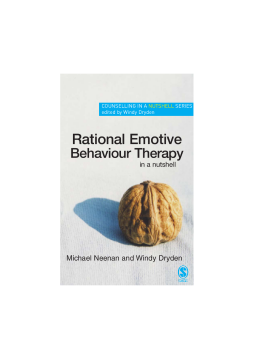
Additional Information
Book Details
Abstract
Students embarking on Rational Emotive Behavior Therapy training are often faced with lengthy and complicated texts from which to learn the theory and practice of the approach. Rational Emotive Behaviour Therapy in a Nutshell provides a relief from this by providing a concise and comprehensive guide to all the key elements of REBT. The authors believe that students of REBT can enhance their knowledge of the approach only if they have fully grasped the basics first. They offer a succinct introduction to REBT which students can use as a starting point before adding to their knowledge through further reading and learning. The book opens with an explanation of the ABCDE Model of Emotional Disturbance and Change which is the centrepiece of REBT theory and practice. The authors present the model in a way which is easy to grasp, but also has the depth of coverage needed for full understanding.
`Size-wise, these books span an open palm and have a very handy flap on the back and front as an integral feature of the cover which can be used as a bookmark. They are concise, yet thorough, providing introductions to the key elements of the theory and practice underpinning major therapeutic approaches… [An] ideal 'intro'… I would recommend these books because, 'in a nutshell', they work' - Therapy Today
Table of Contents
| Section Title | Page | Action | Price |
|---|---|---|---|
| Contributors | |||
| Preface | |||
| Cultures, spirituality, and development 1 | |||
| Culture, liberation, and 'development' 25 | |||
| Globalism and nationalism: which one is bad? 38 | |||
| Faith and economics in 'development': a bridge across the chasm? 45 | |||
| Spirituality: a development taboo 60 | |||
| Communal conflict, NGOs, and the power of religious symbols 78 | |||
| Ethnicity and participatory development methods in Botswana: some participants are to be seen and not heard 92 | |||
| Women, resistance, and development: a case study from Dangs, India 110 | |||
| Gendering the millennium: globalising women 130 | |||
| Stressed, depressed, or bewitched? A perspective on mental health, culture, and religion 142 | |||
| Responding to mental distress in the Third World: cultural imperialism or the struggle for synthesis? 155 | |||
| Research into local culture: implications for participatory development 168 | |||
| Some thoughts on gender and culture 174 | |||
| Resources 177 | |||
| Index 194 |
